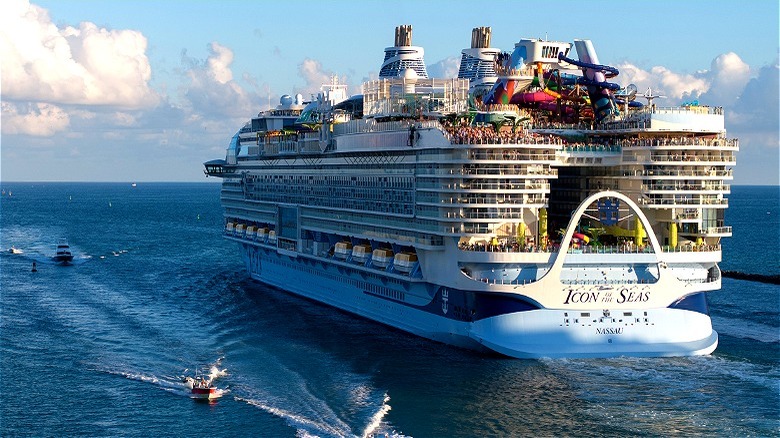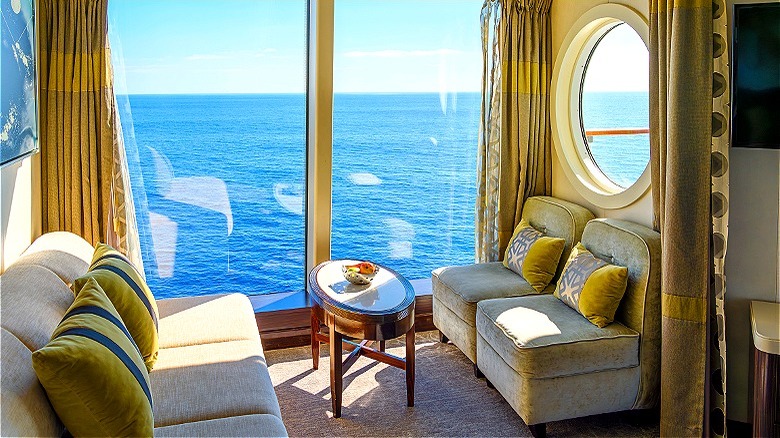A Financial Expert Explains Why Cruise Ship Retirement Isn't Actually Practical
While traveling the world during retirement might sound like a fantasy, more and more people are making it their reality. Increasingly, "retirees-at-sea" are choosing to spend extended periods of time aboard cruise ships traveling the world. According to the Cruise Lines International Association, 50% of the 20.4 million people who took a cruise in 2022 were over the age of 50 (while 32% were over 60). This might have you wondering if it could be an option for your own retirement. While, in theory, a cruise ship might seem like a great way to combine all of your living and travel expenses, the actuality of making a cruise ship your full-time home involves a lot more consideration.
Money Digest spoke with Lawrence Sprung, CFP, author of "Financial Planning Made Personal," and founder of Mitlin Financial, about the growing trend of people retiring at sea. Sprung said the cruise ship retirement trend is actually smaller than you probably realize, saying, "I believe that a small select group of retirees are choosing this lifestyle." This is largely due to the sheer amount of considerations that are required to make this kind of retirement possible (not to mention the personal and financial implications). Sprung also noted, "The lifestyle provided by a cruise ship retirement is not for everyone and really caters to a niche group of people." There can be sacrifices required for this kind of retirement that many might not have considered before. Let's dive into some of the important decisions to consider before retiring at sea.
Is cruise ship retirement right for you?
One of the biggest factors for anyone considering cruise retirement is to decide just how much time you want to spend at sea. Said Lawrence Sprung, "There is [...] a huge difference between simply taking an extended cruise for a year, let's say, and making a ship your permanent home." For those who might not want to live permanently at sea, but still spend significant time on a cruise ship, there can be important logistical hurdles to consider. Sprung explained that deciding to pursue extended cruise retirement plans (as opposed to permanently living at sea) can often be more complicated than a single relocation. This is largely due to the extra time and expense involved in finding the best cruise ship options every year, as well as travel to and from whatever port might be required. There can also be logistical complications with managing your physical home and/or possessions while you're away. (Check out Money Digest's guide to the cheapest states to retire.)
While the opportunity to see the world without the added hassle of traditional travel can be a major perk of retirement at sea, it's important to factor in how this decision might affect other people in your life. "As an example, this type of lifestyle may inhibit your ability to see and spend quality time with your family without incurring some significant additional expenses," Sprung said. Depending on your location choices, it might not be financially feasible to fly yourself home for holidays or special occasions. Signing up to retire at sea might also mean signing up to miss family milestones.
Cost of retiring at sea
A major consideration about spending your retirement on a cruise ship is the expense. Costs can vary, depending on the type of cruise you select. Lawrence Sprung explained that "some ways to sail through your retirement would be to simply book a major cruise line's extended cruise. Royal Caribbean launched a 274-night cruise in December 2023 and that cost between $58,000 and $78,000 per person." If that number has you wincing, it's important to realize that most cruise prices include travel, food, and housekeeping costs. Factoring these things into the total expense can help you do a cost comparison to your everyday life to determine if an extended cruise is in your budget (and won't be a traveling money mistake). It can also be worth comparing cruise costs to services like assisted living to find what best fits into your budget.
For those looking for a more permanent home at sea during retirement, the financials of buying a space on a cruise ship can be equally daunting. Said Sprung, "There are other cruise lines where you can purchase a condo-like living space on the ship, which could cost in the hundreds of thousands to millions, and in many cases, there are monthly expenses or maintenance too." Much like an HOA, living within a community can come with its own complications, fees, and rules that might not appeal to everyone. Bottom line? Sprung told us, "I think for most, this would not be a financial fit. You would need to be in a great financial situation to consider any of the cruise life options available."


